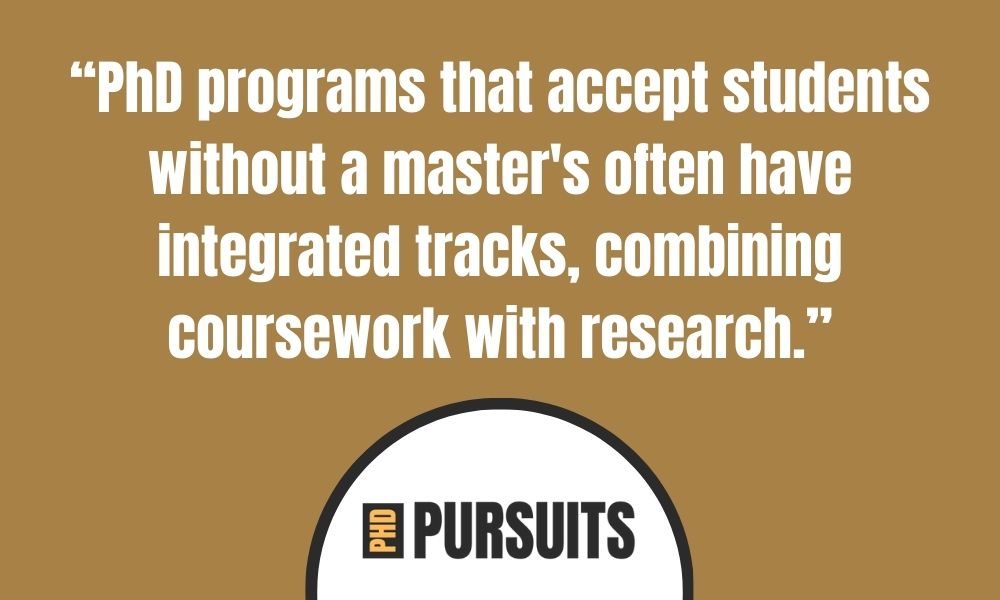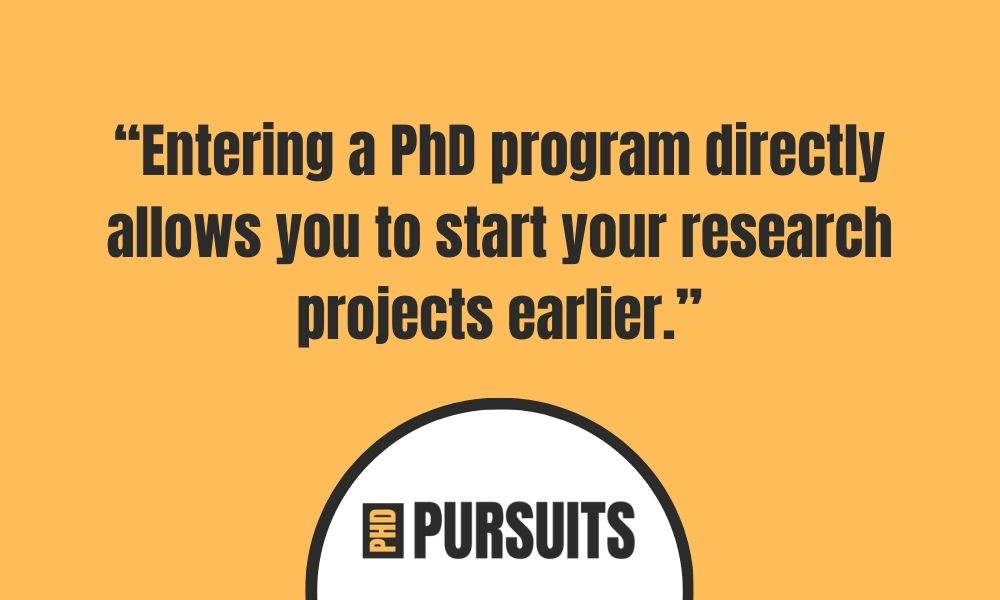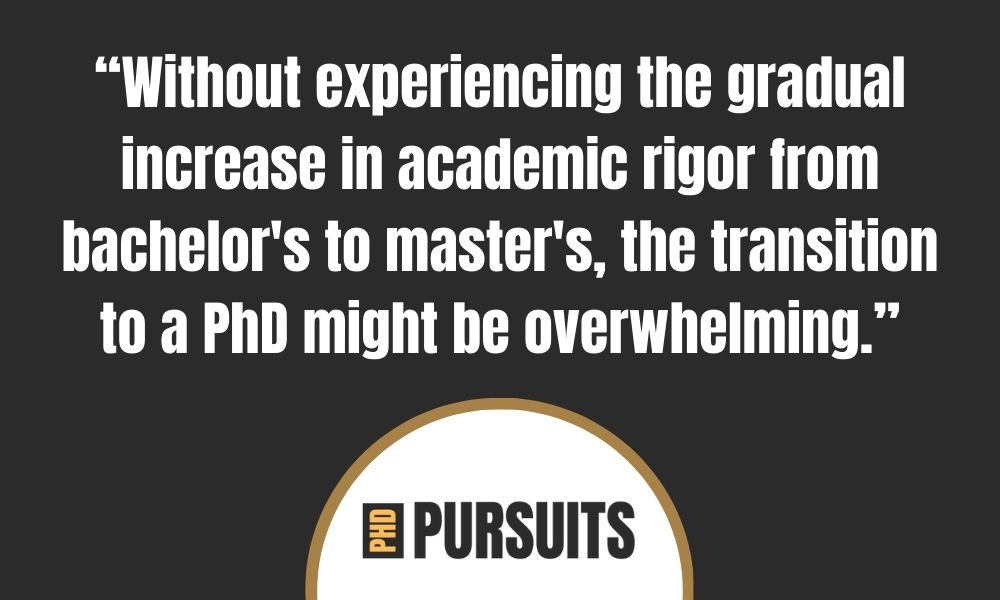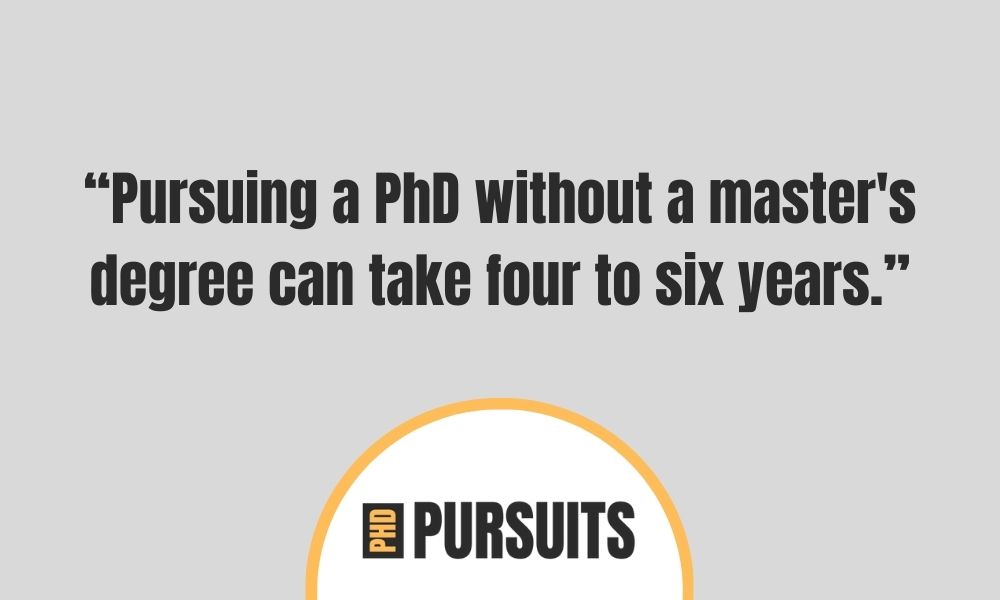Enrolling into a PhD program without first obtaining a master’s degree is a route less traveled. However, it is not impossible.
If you are thinking about the question of “Can I do a PhD with a masters degree?” The short answer is yes. The long one however, is a little bit nuanced.
This article explores the viability of jumping straight into a doctoral program after completing your bachelor’s. We’ll dive into the prerequisites, challenges, and opportunities this unconventional path presents. We’ll also look at how you can pad your bachelor’s degree to apply straight into a PhD program.
Is It Possible To Do A PhD Without A Masters Degree?
Certain PhD programs allow you to apply right after completing your bachelor’s degree. PhD programs that accept students without a master’s often have integrated tracks. These tracks combine the coursework of a master’s with the research focus of a PhD.

This setup is ideal for those ready to commit to the long haul of doctoral studies. In these cases, you undertake a more extensive research project. This often includes a probationary period before you’re fully upgraded to PhD candidacy.
The duration of your PhD might be longer if you enter without a master’s. Typically, a PhD takes three to four years to complete if you already have a master’s degree.
Without one, you might be looking at up to six years. This includes the time you’d spend on master’s level coursework and your doctoral research.
When applying to a PhD without a master’s, your undergraduate record comes under closer scrutiny. Admissions committees look for strong academic performance, particularly in your major field.
They also value any research experience you have. Having a solid relationship with a potential PhD supervisor can also boost your chances. This mentor can guide you through the intricacies of PhD research from day one.
Online PhD programs offer another avenue for those wishing to pursue a doctorate directly after their bachelor’s. These programs sometimes have more flexible admission criteria. Yet, they still demand a high level of dedication and academic excellence.
Why Applying To PhDs Without A Masters Degree Is A Good Idea?
Jumping straight into a PhD program without first completing a master’s degree might sound daunting, but it can be a savvy move for some. Here are five compelling reasons why this path could be a good idea for you:
Time Efficiency
Traditional routes take you from a bachelor’s to a master’s, and only then to a PhD. This can be a lengthy process, often taking over six years.
By going straight to a PhD, you merge this timeline.
Programs designed to accept students without a master’s typically incorporate essential coursework into the doctoral program, allowing you to focus on your research sooner.
Cost Savings
Graduate education is not cheap. By skipping the master’s, you’re not just saving time; you’re also saving tuition fees. This is particularly advantageous if your ultimate goal is a PhD. Funding for PhD students, including:
- bursary,
- stipends and
- tuition waivers
is more common than for master’s students. This financial support can make a doctoral degree more accessible.
Early Research Opportunities
Entering a PhD program directly allows you to start your research projects earlier. This can be a significant advantage, especially in fast-moving fields.

Early research involvement can lead to publications and academic contributions sooner, bolstering your academic profile.
Integrated Programs
Many universities now offer integrated PhD programs. These are designed specifically for students transitioning from an undergraduate degree.
They provide a seamless blend of coursework and research, tailored for those without a master’s degree. This structured pathway ensures you acquire the necessary knowledge and skills systematically.
Maturity and Focus
If you’re certain about your research interests, diving straight into a PhD can demonstrate a high level of commitment and maturity to potential supervisors and funding bodies.
Being focused and dedicated from the outset can make you a more attractive candidate for competitive research positions and grants.
Why Going Straight To PhD Without A Masters Degree Is A Bad Idea?
Jumping straight into a PhD program without a master’s degree may seem appealing for various reasons, it’s not without its drawbacks. Here are five reasons why this path might not be the best choice:
Lack of Foundation
A master’s degree provides a crucial academic foundation. It allows you to delve deeper into your field, beyond what you covered in your undergraduate studies.
Without this intermediate step, you might find yourself struggling with the advanced concepts and rigorous demands of a PhD program.
Research Skills
Master’s programs often serve as a training ground for research skills. They teach you how to:
- formulate research questions,
- design experiments, and
- analyze data.
Jumping straight into a PhD without this training could leave you at a disadvantage, especially when undertaking your own doctoral research project.
Adaptation to Academic Rigor
PhD programs are notoriously intense. They require a level of commitment and intellectual stamina that’s a step above what’s expected at the master’s level.
Without having experienced the gradual increase in academic rigor from bachelor’s to master’s, the transition to a PhD might be overwhelming.

Professional Networking
Master’s programs offer opportunities to build professional networks. You meet:
- peers,
- mentors, and
- industry contacts.
Skipping this stage can mean missing out on forming these crucial connections, which can be instrumental in your future career, be it in academia or industry.
Personal Development
The journey through a master’s program contributes significantly to personal development. It’s a period where many students:
- refine their interests,
- develop expertise, and
- gain clarity on their long-term career goals.
Rushing into a PhD without this phase might lead to uncertainty and a lack of direction in your doctoral studies.
How Good Must Your Bachelors Degree Be To Get Into A PhD Program?
Applying for a PhD straight from your bachelor’s degree means your undergraduate performance carries significant weight.
A strong academic record is crucial. Top grades are often expected, especially in your major subjects. This demonstrates your ability to handle advanced, subject-specific content.
Beyond grades, involvement in research during your undergrad years can set you apart. Whether it’s:
- assisting in a lab,
- conducting a significant final year project, or
- contributing to a publication
Tangible research experience speaks volumes.
PhD programs looking to admit students without a master’s often seek evidence of independent scholarly ability.
This might include a robust final year thesis or dissertation that showcases your research skills and intellectual curiosity.
Letters of recommendation also play a pivotal role. They should ideally come from professors who have closely supervised your academic and research work. If your recommendation letter comes from a prestigious university, this may help in some way too.
These references should speak to:
- your potential as a researcher,
- your work ethic, and
- your ability to contribute to a PhD program.
Being ready for a PhD also means having a clear research interest. You should be able to articulate what you want to study, why it matters, and how you’re uniquely positioned to pursue this research.
Some programs might even expect you to reach out to potential supervisors beforehand to discuss your research interests and fit within their current projects.
How Long Does It Take To Get A Doctorate Without Masters?
Generally, pursuing a PhD without a master’s can extend the journey to obtaining your doctorate.
Typically, a PhD program lasts three to five years if you already hold a master’s. However, without one, you could be looking at four to six years, sometimes even more, depending on your field and program structure.
Integrated PhD programs, designed for students coming straight from an undergraduate degree, merge master’s level coursework with doctoral research. Study programs like these may also take up to six years to complete.

This approach aims to fill any academic gaps and prepare you for the rigors of doctoral research. It’s a comprehensive path, ensuring you’re not just diving in without the necessary groundwork.
For those in fields like science and engineering, lab work and experiments can add to the duration. In the humanities and social sciences, extensive research and thesis-writing can stretch the timeline.
Each PhD candidate’s journey is unique, influenced by:
- research complexities,
- academic requirements, and
- personal dedication.
The commitment to earn a PhD without first obtaining a master’s demands resilience. It’s a longer stretch, but for those ready to dive deep into research and academic inquiry right from their bachelor’s, it can be a rewarding path to academic and professional advancement.
Get A PhD Without A Masters – Possible, With Caution
Pursuing a PhD without a master’s degree is a feasible yet challenging journey, requiring:
- a strong academic foundation,
- research experience, and
- a clear vision of your scholarly goals.
This path can fast-track your academic and research ambitions but demands dedication and resilience.
Before making this leap, consider your readiness, the requirements of your desired program, and the support system you have in place. With the right preparation and mindset, the direct route to a PhD can be a rewarding endeavor.

Dr. JW Ong holds academic degrees, including a Ph.D. in Applied Linguistics from universities in New Zealand, Malaysia, and the UK. He started PhDPursuits.com as a way to share the experience he wish he would have had known before embarking on his PhD.

